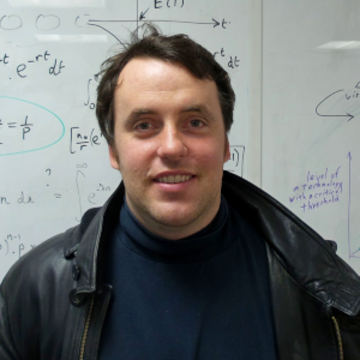
Prior to co-founding Aligned AI, Dr. Stuart Armstrong spent a decade at the Future of Humanity Institute at Oxford University doing deep analysis on the biggest threats confronting humanity including nuclear threats, pandemics, human extinction, space colonisation, and – above all else – AI. Focusing on the power and risk of AI long before others were aware of these issues, Stuart deepened our understanding of AI alignment and developed many novel methods of AI control, publishing extensively and accumulating thousands of citations. His theoretical work reached a stage where it became practical – and, he felt, imperative – to implement it. In 2022 he co-founded Aligned AI with the aim of ensuring that AIs remained safe and under human control. Continuing his trend from academia as a mathematician, he developed several advanced methods for AI alignment – ACE, EquitAI, ClassifAI – which have become IP, patents, and products for the company. Developing these successful methods has confirmed his core belief: that the challenge of getting AIs to follow human values not only must be solved, but can be solved, and will be solved.
He is also a mentor for the Foresight Institute, an Advisor of the AI Safety Camp, and has appeared in several documentaries (“Alien Worlds”, “The Future of Life and Death”, “Odyssey”) and interviews on AI and the future of space exploration.
What is your background? What made you decide to get involved in supporting entrepreneurs?
I was an academic, in mathematics, then in computational bio-chemistry, and finally did a decade of research in how to make AIs safe. I decided that my ideas had progressed to the point that they could be implemented in practice, and advancing AI capabilities made it urgent. With Rebecca Gorman, who has been working on this issue for a long time and was preparing to launch company, we co-founded Aligned AI.
What is your definition of entrepreneurship?
Being responsible for making your idea change the world in practice.
How and when did you know your idea was good enough to develop it?
When it started becoming practical rather than theoretical, without losing its rigour and strength.
What would you say are the top 3 skills that needed to be a successful entrepreneur? Why?
Tolerance of uncertainty.
Willingness to learn and assess mentors/teachers.
Ability to drop things and move on.
It is a very strange experience, where you have to learn and adjust constantly, without knowing the proper way of doing things, and with a lot of people willing to give you advice – advice which is often good, and sometimes terrible, which quality you have to assess yourself, without full knowledge or perspective.
What is your favourite part of being an entrepreneur?
Doing what’s important for the world and for me without constraints.
What individual, company or organization inspires you most? Why?
To be frank, Rebecca Gorman, my co-founder. Seeing her in action is the best co-founder education I can get.
If you had 5 minutes with the above individual/ company/organization, what would you want to ask or discuss?
I have many minutes with her, and we discuss strategy, presentation, vision, organisation details, and so much more.
What has been your most satisfying or successful moment in business?
Making a product from an idea and selling it.
What would you say have been some of your mistakes, failures or lessons learned as an entrepreneur?
Don’t have narrow vision and obsess about something if it doesn’t seem to be bearing fruit. Be confident with investors – you are giving them an opportunity, you are not a supplicant.
How have you funded your ideas?
Pre-seed funding rounds.
Are there any sector-specific awards/grants/competitions that have helped you?
Not yet, but we are applying for R&D credits from the UK government.
What is good about being an entrepreneur in Oxfordshire? Bad?
Good: Lots of smart and motivated people around. UK tax and regulation is generally pro-corporation.
Bad: No strong atmosphere of startups, and not much of an entrepreneur social scene. Few VCs around (at least in comparison with London).
If a new entrepreneur or startup came to you looking for entrepreneurship resources, where would you send them?
To read the book “The Mom Test”, and I’d encourage them to start finding people they can work with, within their network. Oxford County Library has some useful resources.
Any last words of advice?
Try entrepreneurship when you can afford it – either because you have familial support, have built up some wealth, or, to the contrary, are young and with few costs and attachments.